Examining Alternative Dispute Resolution in the English Legal System
VerifiedAdded on 2021/04/24
|7
|1491
|316
Essay
AI Summary
This essay provides a comprehensive analysis of Alternative Dispute Resolution (ADR) within the English legal system. It begins by outlining the historical context, emphasizing the shift from traditional litigation to ADR methods. The essay then delves into various forms of ADR, including arbitration, negotiation, adjudication, conciliation, and mediation, explaining their processes and applications. It further examines the advantages of ADR, such as cost-effectiveness, confidentiality, and time efficiency compared to court proceedings. Conversely, the essay addresses the disadvantages, including the finality of some decisions and the potential for bias. Throughout the essay, relevant case law, such as Kinstreet Ltd v Belmargo Corp Ltd and Premium Nafta Products v Fili Shipping, is cited to support the arguments. The conclusion highlights the complementary roles of litigation and ADR in resolving disputes effectively in the modern era.
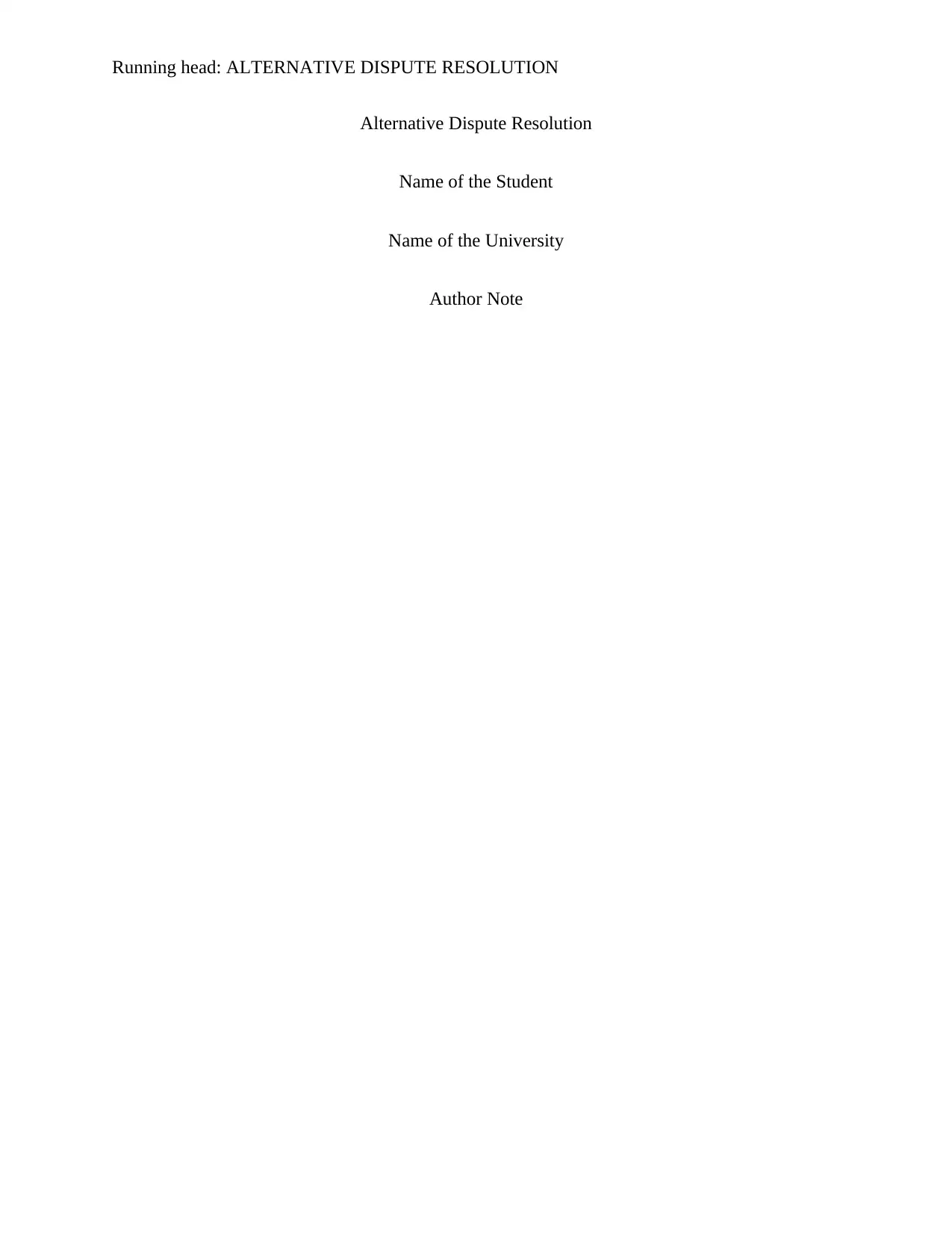
Running head: ALTERNATIVE DISPUTE RESOLUTION
Alternative Dispute Resolution
Name of the Student
Name of the University
Author Note
Alternative Dispute Resolution
Name of the Student
Name of the University
Author Note
Paraphrase This Document
Need a fresh take? Get an instant paraphrase of this document with our AI Paraphraser
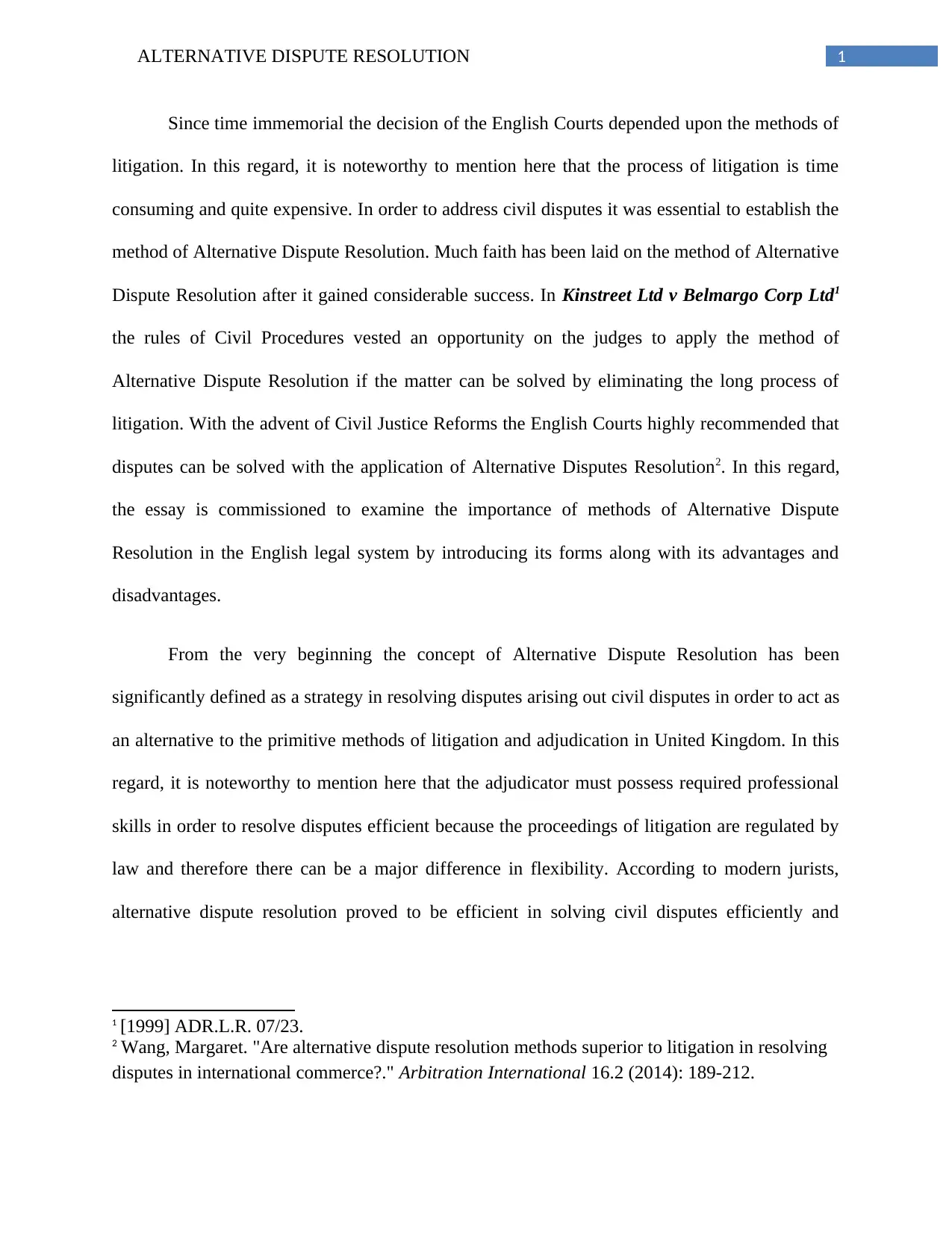
1ALTERNATIVE DISPUTE RESOLUTION
Since time immemorial the decision of the English Courts depended upon the methods of
litigation. In this regard, it is noteworthy to mention here that the process of litigation is time
consuming and quite expensive. In order to address civil disputes it was essential to establish the
method of Alternative Dispute Resolution. Much faith has been laid on the method of Alternative
Dispute Resolution after it gained considerable success. In Kinstreet Ltd v Belmargo Corp Ltd1
the rules of Civil Procedures vested an opportunity on the judges to apply the method of
Alternative Dispute Resolution if the matter can be solved by eliminating the long process of
litigation. With the advent of Civil Justice Reforms the English Courts highly recommended that
disputes can be solved with the application of Alternative Disputes Resolution2. In this regard,
the essay is commissioned to examine the importance of methods of Alternative Dispute
Resolution in the English legal system by introducing its forms along with its advantages and
disadvantages.
From the very beginning the concept of Alternative Dispute Resolution has been
significantly defined as a strategy in resolving disputes arising out civil disputes in order to act as
an alternative to the primitive methods of litigation and adjudication in United Kingdom. In this
regard, it is noteworthy to mention here that the adjudicator must possess required professional
skills in order to resolve disputes efficient because the proceedings of litigation are regulated by
law and therefore there can be a major difference in flexibility. According to modern jurists,
alternative dispute resolution proved to be efficient in solving civil disputes efficiently and
1 [1999] ADR.L.R. 07/23.
2 Wang, Margaret. "Are alternative dispute resolution methods superior to litigation in resolving
disputes in international commerce?." Arbitration International 16.2 (2014): 189-212.
Since time immemorial the decision of the English Courts depended upon the methods of
litigation. In this regard, it is noteworthy to mention here that the process of litigation is time
consuming and quite expensive. In order to address civil disputes it was essential to establish the
method of Alternative Dispute Resolution. Much faith has been laid on the method of Alternative
Dispute Resolution after it gained considerable success. In Kinstreet Ltd v Belmargo Corp Ltd1
the rules of Civil Procedures vested an opportunity on the judges to apply the method of
Alternative Dispute Resolution if the matter can be solved by eliminating the long process of
litigation. With the advent of Civil Justice Reforms the English Courts highly recommended that
disputes can be solved with the application of Alternative Disputes Resolution2. In this regard,
the essay is commissioned to examine the importance of methods of Alternative Dispute
Resolution in the English legal system by introducing its forms along with its advantages and
disadvantages.
From the very beginning the concept of Alternative Dispute Resolution has been
significantly defined as a strategy in resolving disputes arising out civil disputes in order to act as
an alternative to the primitive methods of litigation and adjudication in United Kingdom. In this
regard, it is noteworthy to mention here that the adjudicator must possess required professional
skills in order to resolve disputes efficient because the proceedings of litigation are regulated by
law and therefore there can be a major difference in flexibility. According to modern jurists,
alternative dispute resolution proved to be efficient in solving civil disputes efficiently and
1 [1999] ADR.L.R. 07/23.
2 Wang, Margaret. "Are alternative dispute resolution methods superior to litigation in resolving
disputes in international commerce?." Arbitration International 16.2 (2014): 189-212.
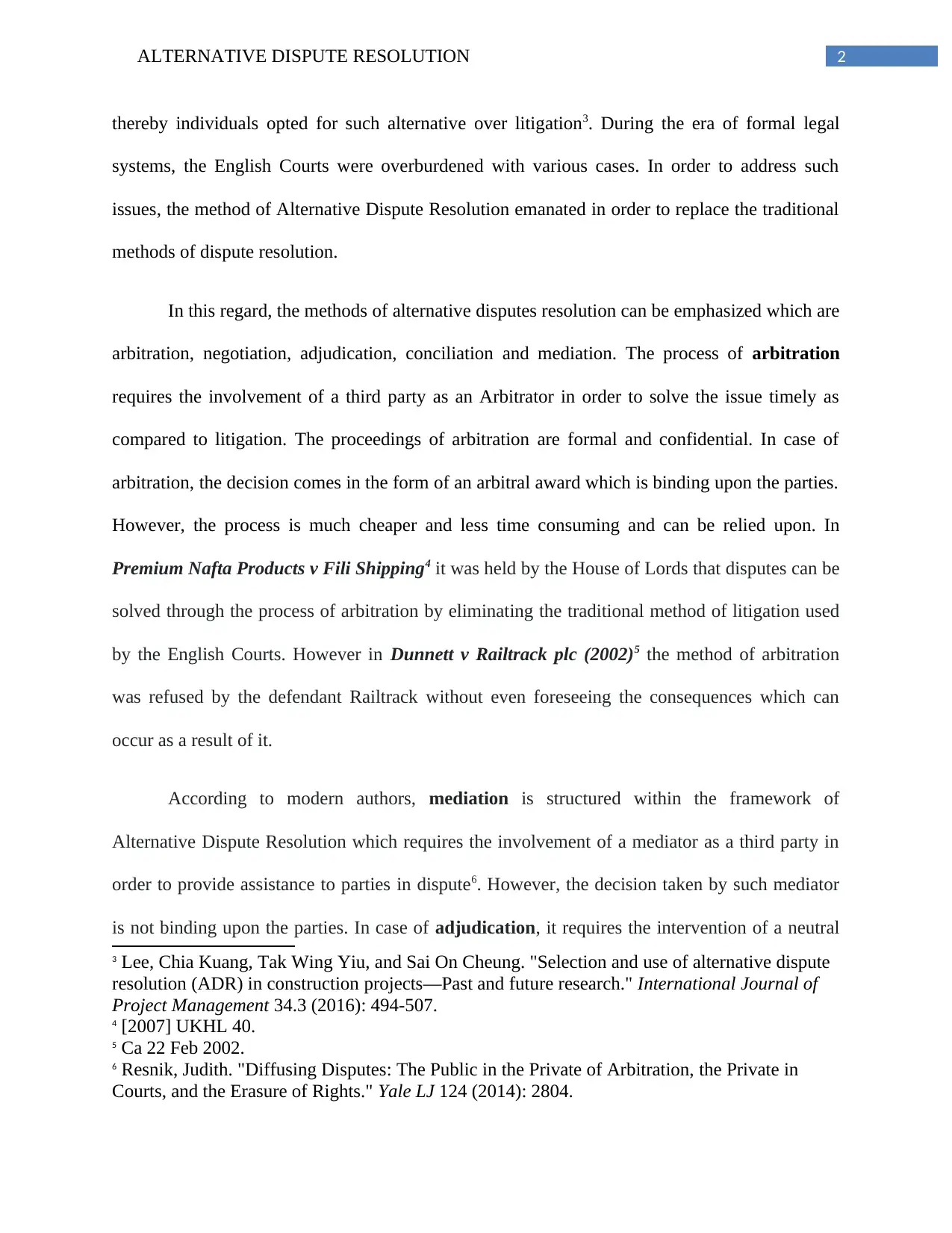
2ALTERNATIVE DISPUTE RESOLUTION
thereby individuals opted for such alternative over litigation3. During the era of formal legal
systems, the English Courts were overburdened with various cases. In order to address such
issues, the method of Alternative Dispute Resolution emanated in order to replace the traditional
methods of dispute resolution.
In this regard, the methods of alternative disputes resolution can be emphasized which are
arbitration, negotiation, adjudication, conciliation and mediation. The process of arbitration
requires the involvement of a third party as an Arbitrator in order to solve the issue timely as
compared to litigation. The proceedings of arbitration are formal and confidential. In case of
arbitration, the decision comes in the form of an arbitral award which is binding upon the parties.
However, the process is much cheaper and less time consuming and can be relied upon. In
Premium Nafta Products v Fili Shipping4 it was held by the House of Lords that disputes can be
solved through the process of arbitration by eliminating the traditional method of litigation used
by the English Courts. However in Dunnett v Railtrack plc (2002)5 the method of arbitration
was refused by the defendant Railtrack without even foreseeing the consequences which can
occur as a result of it.
According to modern authors, mediation is structured within the framework of
Alternative Dispute Resolution which requires the involvement of a mediator as a third party in
order to provide assistance to parties in dispute6. However, the decision taken by such mediator
is not binding upon the parties. In case of adjudication, it requires the intervention of a neutral
3 Lee, Chia Kuang, Tak Wing Yiu, and Sai On Cheung. "Selection and use of alternative dispute
resolution (ADR) in construction projects—Past and future research." International Journal of
Project Management 34.3 (2016): 494-507.
4 [2007] UKHL 40.
5 Ca 22 Feb 2002.
6 Resnik, Judith. "Diffusing Disputes: The Public in the Private of Arbitration, the Private in
Courts, and the Erasure of Rights." Yale LJ 124 (2014): 2804.
thereby individuals opted for such alternative over litigation3. During the era of formal legal
systems, the English Courts were overburdened with various cases. In order to address such
issues, the method of Alternative Dispute Resolution emanated in order to replace the traditional
methods of dispute resolution.
In this regard, the methods of alternative disputes resolution can be emphasized which are
arbitration, negotiation, adjudication, conciliation and mediation. The process of arbitration
requires the involvement of a third party as an Arbitrator in order to solve the issue timely as
compared to litigation. The proceedings of arbitration are formal and confidential. In case of
arbitration, the decision comes in the form of an arbitral award which is binding upon the parties.
However, the process is much cheaper and less time consuming and can be relied upon. In
Premium Nafta Products v Fili Shipping4 it was held by the House of Lords that disputes can be
solved through the process of arbitration by eliminating the traditional method of litigation used
by the English Courts. However in Dunnett v Railtrack plc (2002)5 the method of arbitration
was refused by the defendant Railtrack without even foreseeing the consequences which can
occur as a result of it.
According to modern authors, mediation is structured within the framework of
Alternative Dispute Resolution which requires the involvement of a mediator as a third party in
order to provide assistance to parties in dispute6. However, the decision taken by such mediator
is not binding upon the parties. In case of adjudication, it requires the intervention of a neutral
3 Lee, Chia Kuang, Tak Wing Yiu, and Sai On Cheung. "Selection and use of alternative dispute
resolution (ADR) in construction projects—Past and future research." International Journal of
Project Management 34.3 (2016): 494-507.
4 [2007] UKHL 40.
5 Ca 22 Feb 2002.
6 Resnik, Judith. "Diffusing Disputes: The Public in the Private of Arbitration, the Private in
Courts, and the Erasure of Rights." Yale LJ 124 (2014): 2804.
⊘ This is a preview!⊘
Do you want full access?
Subscribe today to unlock all pages.

Trusted by 1+ million students worldwide
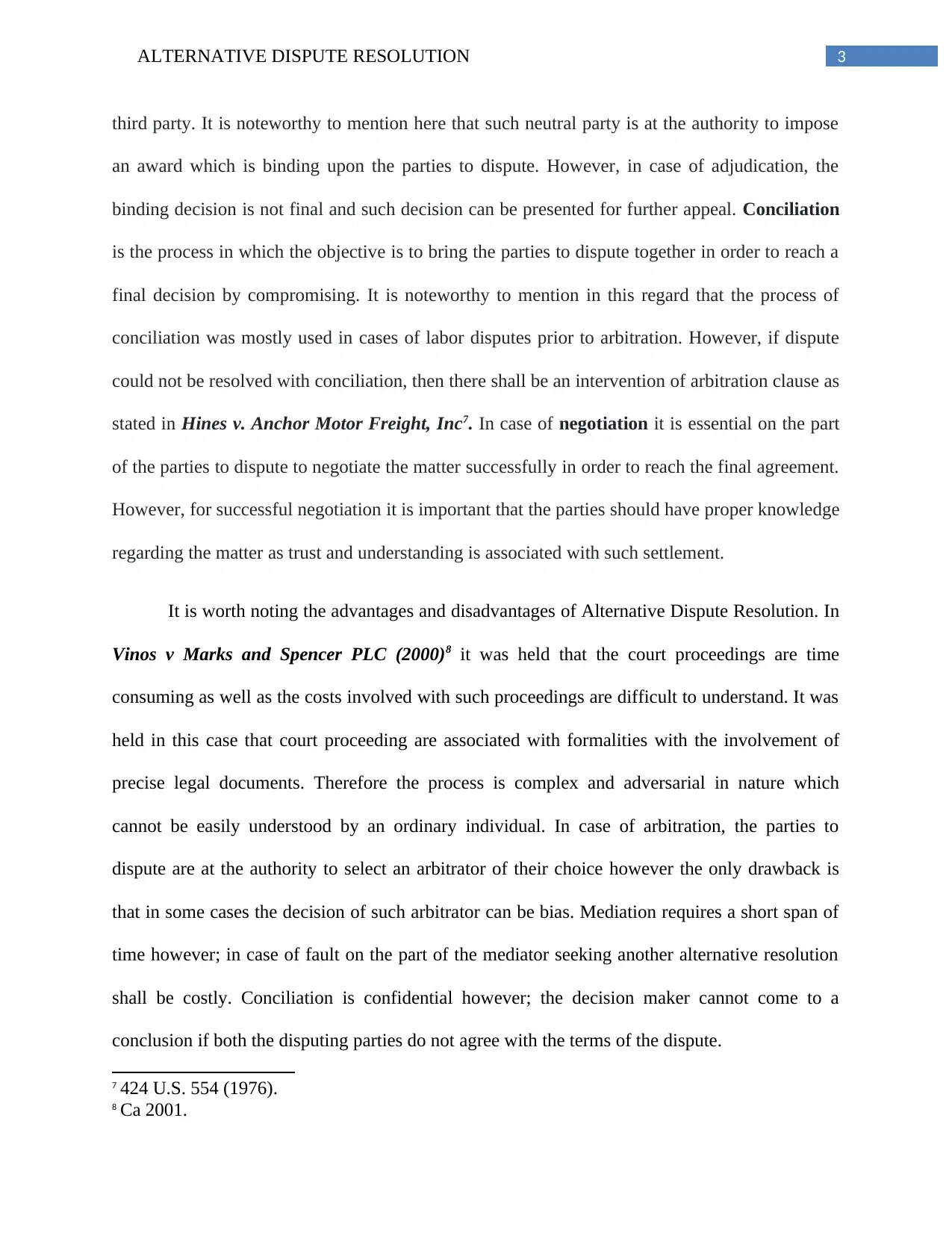
3ALTERNATIVE DISPUTE RESOLUTION
third party. It is noteworthy to mention here that such neutral party is at the authority to impose
an award which is binding upon the parties to dispute. However, in case of adjudication, the
binding decision is not final and such decision can be presented for further appeal. Conciliation
is the process in which the objective is to bring the parties to dispute together in order to reach a
final decision by compromising. It is noteworthy to mention in this regard that the process of
conciliation was mostly used in cases of labor disputes prior to arbitration. However, if dispute
could not be resolved with conciliation, then there shall be an intervention of arbitration clause as
stated in Hines v. Anchor Motor Freight, Inc7. In case of negotiation it is essential on the part
of the parties to dispute to negotiate the matter successfully in order to reach the final agreement.
However, for successful negotiation it is important that the parties should have proper knowledge
regarding the matter as trust and understanding is associated with such settlement.
It is worth noting the advantages and disadvantages of Alternative Dispute Resolution. In
Vinos v Marks and Spencer PLC (2000)8 it was held that the court proceedings are time
consuming as well as the costs involved with such proceedings are difficult to understand. It was
held in this case that court proceeding are associated with formalities with the involvement of
precise legal documents. Therefore the process is complex and adversarial in nature which
cannot be easily understood by an ordinary individual. In case of arbitration, the parties to
dispute are at the authority to select an arbitrator of their choice however the only drawback is
that in some cases the decision of such arbitrator can be bias. Mediation requires a short span of
time however; in case of fault on the part of the mediator seeking another alternative resolution
shall be costly. Conciliation is confidential however; the decision maker cannot come to a
conclusion if both the disputing parties do not agree with the terms of the dispute.
7 424 U.S. 554 (1976).
8 Ca 2001.
third party. It is noteworthy to mention here that such neutral party is at the authority to impose
an award which is binding upon the parties to dispute. However, in case of adjudication, the
binding decision is not final and such decision can be presented for further appeal. Conciliation
is the process in which the objective is to bring the parties to dispute together in order to reach a
final decision by compromising. It is noteworthy to mention in this regard that the process of
conciliation was mostly used in cases of labor disputes prior to arbitration. However, if dispute
could not be resolved with conciliation, then there shall be an intervention of arbitration clause as
stated in Hines v. Anchor Motor Freight, Inc7. In case of negotiation it is essential on the part
of the parties to dispute to negotiate the matter successfully in order to reach the final agreement.
However, for successful negotiation it is important that the parties should have proper knowledge
regarding the matter as trust and understanding is associated with such settlement.
It is worth noting the advantages and disadvantages of Alternative Dispute Resolution. In
Vinos v Marks and Spencer PLC (2000)8 it was held that the court proceedings are time
consuming as well as the costs involved with such proceedings are difficult to understand. It was
held in this case that court proceeding are associated with formalities with the involvement of
precise legal documents. Therefore the process is complex and adversarial in nature which
cannot be easily understood by an ordinary individual. In case of arbitration, the parties to
dispute are at the authority to select an arbitrator of their choice however the only drawback is
that in some cases the decision of such arbitrator can be bias. Mediation requires a short span of
time however; in case of fault on the part of the mediator seeking another alternative resolution
shall be costly. Conciliation is confidential however; the decision maker cannot come to a
conclusion if both the disputing parties do not agree with the terms of the dispute.
7 424 U.S. 554 (1976).
8 Ca 2001.
Paraphrase This Document
Need a fresh take? Get an instant paraphrase of this document with our AI Paraphraser
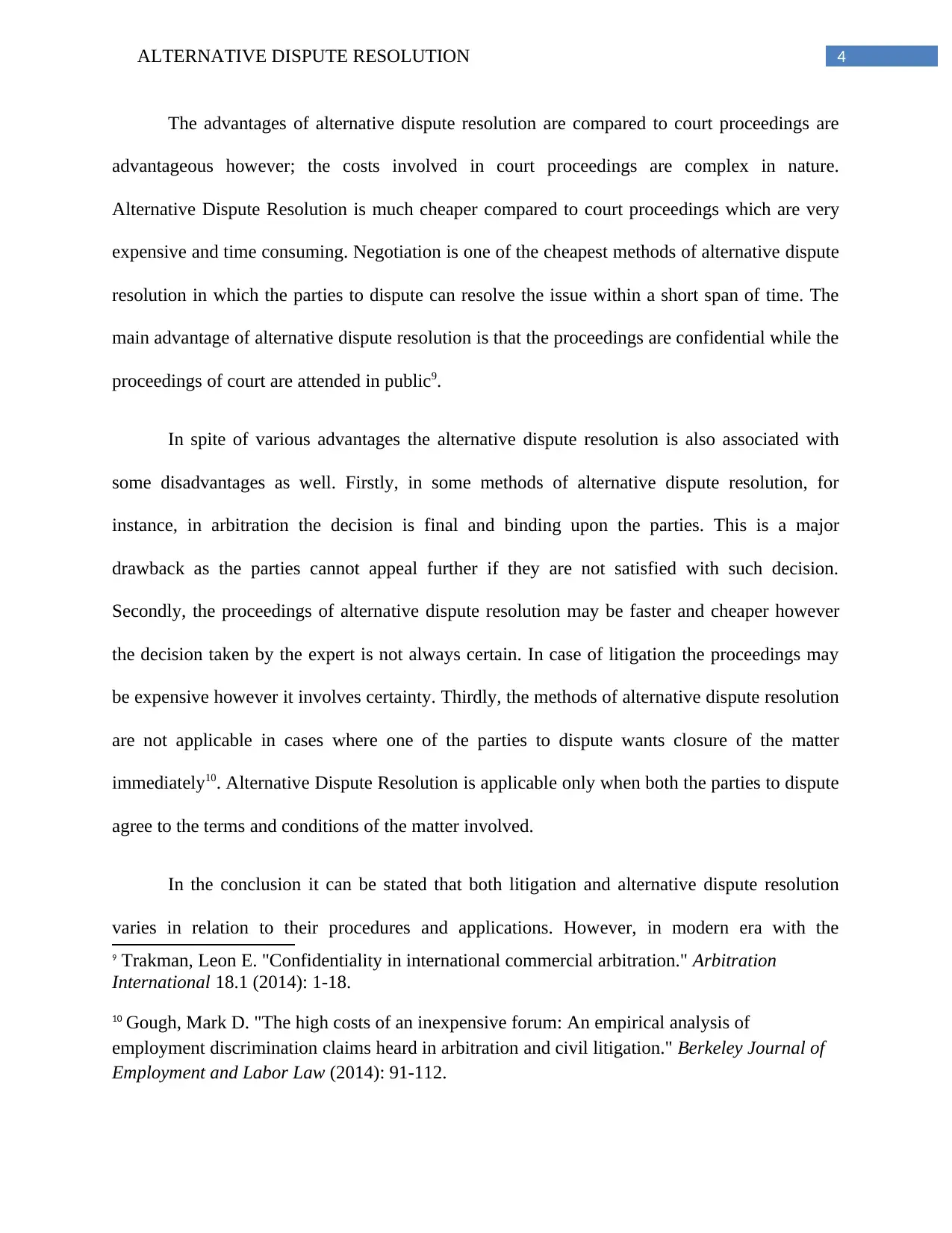
4ALTERNATIVE DISPUTE RESOLUTION
The advantages of alternative dispute resolution are compared to court proceedings are
advantageous however; the costs involved in court proceedings are complex in nature.
Alternative Dispute Resolution is much cheaper compared to court proceedings which are very
expensive and time consuming. Negotiation is one of the cheapest methods of alternative dispute
resolution in which the parties to dispute can resolve the issue within a short span of time. The
main advantage of alternative dispute resolution is that the proceedings are confidential while the
proceedings of court are attended in public9.
In spite of various advantages the alternative dispute resolution is also associated with
some disadvantages as well. Firstly, in some methods of alternative dispute resolution, for
instance, in arbitration the decision is final and binding upon the parties. This is a major
drawback as the parties cannot appeal further if they are not satisfied with such decision.
Secondly, the proceedings of alternative dispute resolution may be faster and cheaper however
the decision taken by the expert is not always certain. In case of litigation the proceedings may
be expensive however it involves certainty. Thirdly, the methods of alternative dispute resolution
are not applicable in cases where one of the parties to dispute wants closure of the matter
immediately10. Alternative Dispute Resolution is applicable only when both the parties to dispute
agree to the terms and conditions of the matter involved.
In the conclusion it can be stated that both litigation and alternative dispute resolution
varies in relation to their procedures and applications. However, in modern era with the
9 Trakman, Leon E. "Confidentiality in international commercial arbitration." Arbitration
International 18.1 (2014): 1-18.
10 Gough, Mark D. "The high costs of an inexpensive forum: An empirical analysis of
employment discrimination claims heard in arbitration and civil litigation." Berkeley Journal of
Employment and Labor Law (2014): 91-112.
The advantages of alternative dispute resolution are compared to court proceedings are
advantageous however; the costs involved in court proceedings are complex in nature.
Alternative Dispute Resolution is much cheaper compared to court proceedings which are very
expensive and time consuming. Negotiation is one of the cheapest methods of alternative dispute
resolution in which the parties to dispute can resolve the issue within a short span of time. The
main advantage of alternative dispute resolution is that the proceedings are confidential while the
proceedings of court are attended in public9.
In spite of various advantages the alternative dispute resolution is also associated with
some disadvantages as well. Firstly, in some methods of alternative dispute resolution, for
instance, in arbitration the decision is final and binding upon the parties. This is a major
drawback as the parties cannot appeal further if they are not satisfied with such decision.
Secondly, the proceedings of alternative dispute resolution may be faster and cheaper however
the decision taken by the expert is not always certain. In case of litigation the proceedings may
be expensive however it involves certainty. Thirdly, the methods of alternative dispute resolution
are not applicable in cases where one of the parties to dispute wants closure of the matter
immediately10. Alternative Dispute Resolution is applicable only when both the parties to dispute
agree to the terms and conditions of the matter involved.
In the conclusion it can be stated that both litigation and alternative dispute resolution
varies in relation to their procedures and applications. However, in modern era with the
9 Trakman, Leon E. "Confidentiality in international commercial arbitration." Arbitration
International 18.1 (2014): 1-18.
10 Gough, Mark D. "The high costs of an inexpensive forum: An empirical analysis of
employment discrimination claims heard in arbitration and civil litigation." Berkeley Journal of
Employment and Labor Law (2014): 91-112.

5ALTERNATIVE DISPUTE RESOLUTION
employment of both the methods of litigation and ADR the areas of dispute can be dealt
efficiently.
employment of both the methods of litigation and ADR the areas of dispute can be dealt
efficiently.
⊘ This is a preview!⊘
Do you want full access?
Subscribe today to unlock all pages.

Trusted by 1+ million students worldwide
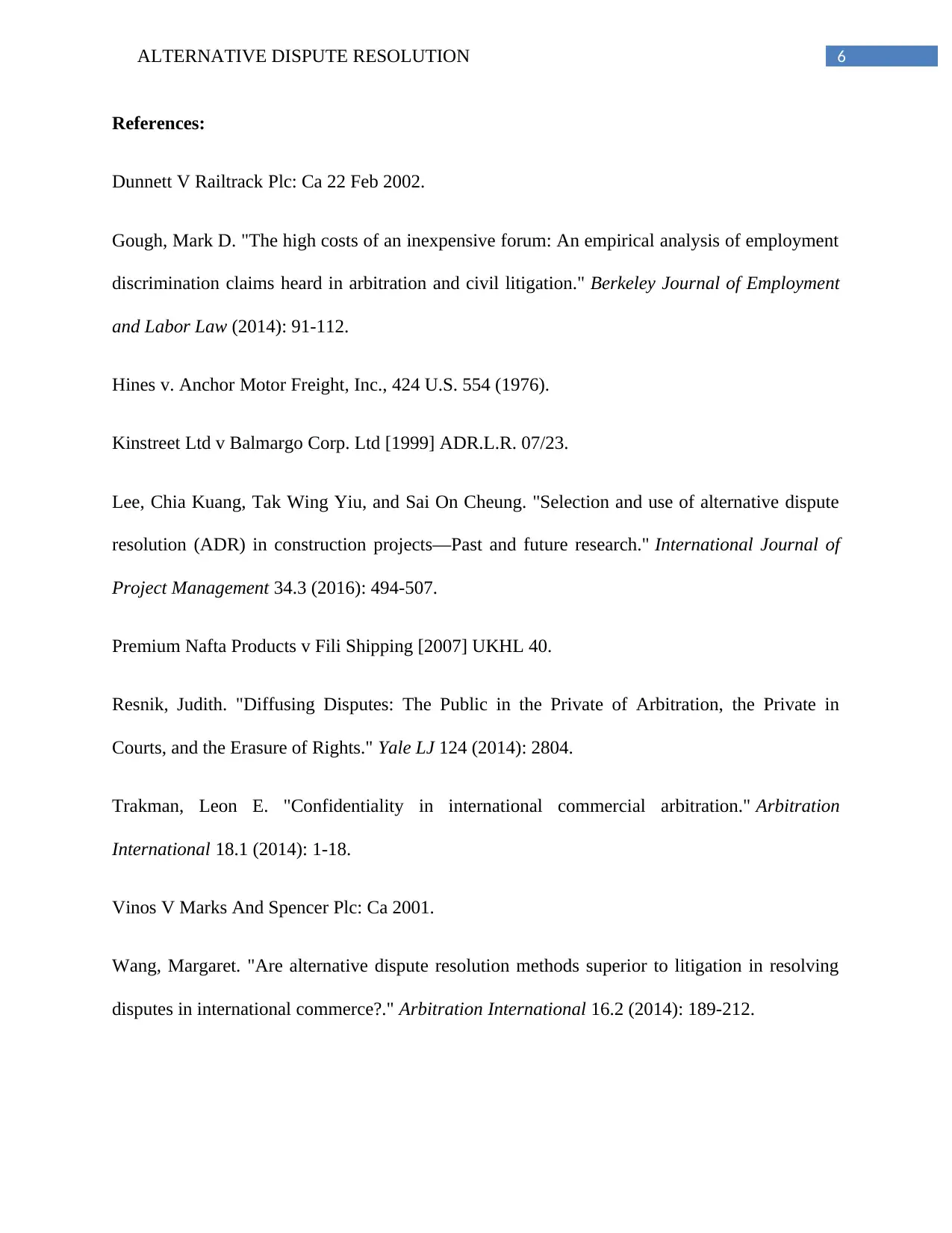
6ALTERNATIVE DISPUTE RESOLUTION
References:
Dunnett V Railtrack Plc: Ca 22 Feb 2002.
Gough, Mark D. "The high costs of an inexpensive forum: An empirical analysis of employment
discrimination claims heard in arbitration and civil litigation." Berkeley Journal of Employment
and Labor Law (2014): 91-112.
Hines v. Anchor Motor Freight, Inc., 424 U.S. 554 (1976).
Kinstreet Ltd v Balmargo Corp. Ltd [1999] ADR.L.R. 07/23.
Lee, Chia Kuang, Tak Wing Yiu, and Sai On Cheung. "Selection and use of alternative dispute
resolution (ADR) in construction projects—Past and future research." International Journal of
Project Management 34.3 (2016): 494-507.
Premium Nafta Products v Fili Shipping [2007] UKHL 40.
Resnik, Judith. "Diffusing Disputes: The Public in the Private of Arbitration, the Private in
Courts, and the Erasure of Rights." Yale LJ 124 (2014): 2804.
Trakman, Leon E. "Confidentiality in international commercial arbitration." Arbitration
International 18.1 (2014): 1-18.
Vinos V Marks And Spencer Plc: Ca 2001.
Wang, Margaret. "Are alternative dispute resolution methods superior to litigation in resolving
disputes in international commerce?." Arbitration International 16.2 (2014): 189-212.
References:
Dunnett V Railtrack Plc: Ca 22 Feb 2002.
Gough, Mark D. "The high costs of an inexpensive forum: An empirical analysis of employment
discrimination claims heard in arbitration and civil litigation." Berkeley Journal of Employment
and Labor Law (2014): 91-112.
Hines v. Anchor Motor Freight, Inc., 424 U.S. 554 (1976).
Kinstreet Ltd v Balmargo Corp. Ltd [1999] ADR.L.R. 07/23.
Lee, Chia Kuang, Tak Wing Yiu, and Sai On Cheung. "Selection and use of alternative dispute
resolution (ADR) in construction projects—Past and future research." International Journal of
Project Management 34.3 (2016): 494-507.
Premium Nafta Products v Fili Shipping [2007] UKHL 40.
Resnik, Judith. "Diffusing Disputes: The Public in the Private of Arbitration, the Private in
Courts, and the Erasure of Rights." Yale LJ 124 (2014): 2804.
Trakman, Leon E. "Confidentiality in international commercial arbitration." Arbitration
International 18.1 (2014): 1-18.
Vinos V Marks And Spencer Plc: Ca 2001.
Wang, Margaret. "Are alternative dispute resolution methods superior to litigation in resolving
disputes in international commerce?." Arbitration International 16.2 (2014): 189-212.
1 out of 7
Related Documents
Your All-in-One AI-Powered Toolkit for Academic Success.
+13062052269
info@desklib.com
Available 24*7 on WhatsApp / Email
![[object Object]](/_next/static/media/star-bottom.7253800d.svg)
Unlock your academic potential
Copyright © 2020–2026 A2Z Services. All Rights Reserved. Developed and managed by ZUCOL.





